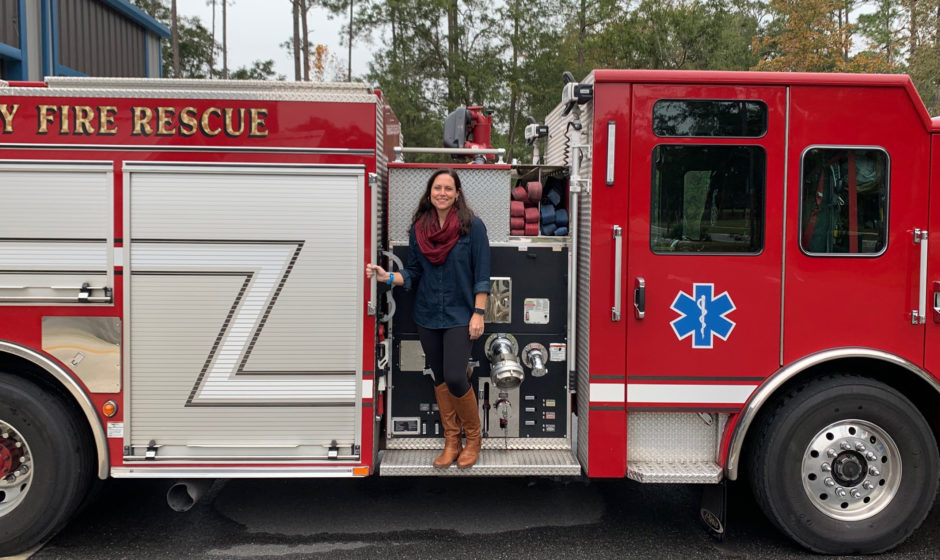FAMU Professor Secures $3.5M to Support Wellness of Florida’s First Responders

A Florida A&M University (FAMU) College of Pharmacy & Pharmaceutical Sciences, Institute of Public Health (CoPPS,IPH) faculty member secured an estimated $2.5 million from the Florida Department of Children and Families to continue collaborative efforts to support the wellness of the state’s first responders.
This new award is in addition to more than $1 million in previously awarded external funding for first responder resiliency initiatives secured by Kellie O’Dare, Ph.D., assistant professor in the Institute of Public Health and director of the 2nd Alarm Project. O’Dare received the grant as part of an initiative spearheaded by Florida First Lady Casey DeSantis. Overall, the statewide initiative includes $12 million in funding for programs and services for first responders and their families.
As a part of this statewide initiative, O’Dare’s projects have been awarded an estimated $2.5 million in funding, which will support two primary endeavors. First, the award will facilitate the development and dissemination of an open-access “Tactical Resiliency Toolkit” for first responders.
The toolkit is an evidence-based, culturally competent behavioral health and resiliency resource that will enable first responder agencies statewide to increase internal capacity to build and sustain their own comprehensive wellness programs for members, families, and retirees, O’Dare said.
“First responders are trained to respond to a wide range of public and private emergency situations. On any given call, they respond to a variety of potentially traumatic events, witnessing severe human suffering, deceased or grievously injured children, mass casualties, highly distraught survivors or bystanders, victims of crime, and sudden/accidental violent death,” O’Dare said. “Repeated exposure to these traumas, combined with chronic off-the-job and everyday stressors, may have an adverse impact on the mental health of first responders and their family members.”
Even as their jobs take a toll, first-responders need tools to handle their mental health issues, O’Dare said.
“As a population, first responders are more likely to experience untreated Post-Traumatic Stress Disorder (PTSD), mood disorders such as depression and anxiety, substance use, and suicidal thoughts. In the past, first responders were deemed weak if they talked about the feelings or problems they were experiencing due to their environment,” O’Dare said. “Unfortunately, many first responders have developed serious mental health and co-occurring substance use issues or ultimately found themselves embattled with the struggle of suicidal thoughts and behaviors that can potentially lead to tragically ending their own life. Combined with stigma surrounding help-seeking behaviors, lack of systematic resource and referral programs, and other barriers to care, first responders do not routinely receive a continuum of evidence-based assessment and treatment services from trained mental health professionals.”
The goals of the toolkit include providing resources to mitigate traumatic stress and to reduce the incidence of attempted and completed suicide among responders. The toolkit development is in partnership with David Rozek, Ph.D., director of the National Center for Excellence for First Responder Behavioral Health at the University of Central Florida RESTORES.
Secondly, the award will strengthen and expand 2nd Alarm Project’s successful, evidence-based behavioral health supports to first responders and families in the Northwest Florida Region.
A survey conducted by O’Dare and her FAMU team in partnership with their colleagues at the University of West Florida found that among about 1,500 Northwest Florida first responders surveyed, more than 75 percent showed signs of depression, 39 percent reported anxiety and 23 percent symptoms of PTSD. The study also found a significant association between exposure to traumatic events on the job and higher prevalence of mental health and substance use concerns.
“This award is a testament to the commitment, passion and hard work of our public health faculty member Dr. Kellie O’Dare, in addressing the need for strengthening the behavioral wellness of Florida’s first responders,” said Cynthia Harris, Ph.D., director of the Institute of Public Health and CoPPS, IPH associate dean. “The health of first responders, and their families, will be sustained by providing much needed resources and peer support to corresponding agencies statewide.”
Services O’Dare and her team will provide include developing and sustaining first responder peer support networks, increasing coordination of mental health resources for deployment during disasters and critical incidents, aligning information and referral resources, providing behavioral health navigation services, and promoting long term sustainability of behavioral health access programs for first responders and their families through regional strategic planning efforts.
“The broader vision of these projects is to ensure individual, family, and organizational level resilience within our first responder communities in order to improve the quality of life for our first responders and their family members throughout their careers and into retirement,” O’Dare said.
In July 2021, she traveled to South Florida with Tallahassee first responders who were part of the search and rescue efforts at the Champlain Towers South collapse in Surfside.
This article originally appeared in FAMU News on March 3, 2022.



